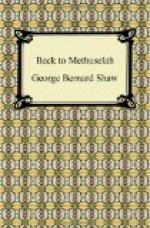Accordingly, in 1901, I took the legend of Don Juan in its Mozartian form and made it a dramatic parable of Creative Evolution. But being then at the height of my invention and comedic talent, I decorated it too brilliantly and lavishly. I surrounded it with a comedy of which it formed only one act, and that act was so completely episodical (it was a dream which did not affect the action of the piece) that the comedy could be detached and played by itself: indeed it could hardly be played at full length owing to the enormous length of the entire work, though that feat has been performed a few times in Scotland by Mr Esme Percy, who led one of the forlorn hopes of the advanced drama at that time. Also I supplied the published work with an imposing framework consisting of a preface, an appendix called The Revolutionist’s Handbook, and a final display of aphoristic fireworks. The effect was so vertiginous, apparently, that nobody noticed the new religion in the centre of the intellectual whirlpool. Now I protest I did not cut these cerebral capers in mere inconsiderate exuberance. I did it because the worst convention of the criticism of the theatre current at that time was that intellectual seriousness is out of place on the stage; that the theatre is a place of shallow amusement; that people go there to be soothed after the enormous intellectual strain of a day in the city: in short, that a playwright is a person whose business it is to make unwholesome confectionery out of cheap emotions. My answer to this was to put all my intellectual goods




